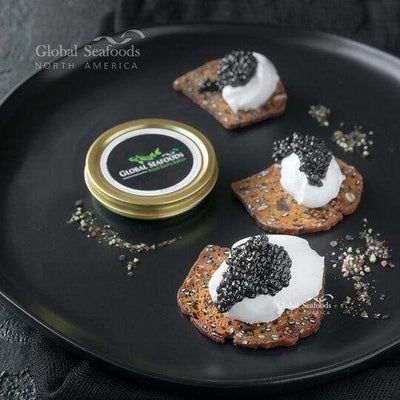Beluga Caviar Benefits: Luxury Meets Nutrition

Beluga Caviar: A Luxurious Delicacy with Remarkable Health Benefits
What is Beluga Caviar?
Beluga caviar is more than just a luxurious treat—it is a nutritional powerhouse. Harvested from the Beluga sturgeon (Huso huso), native to the Caspian and Black Seas, this caviar is famous for its large, delicate eggs, creamy texture, and buttery flavor. Its rarity and unmatched quality make it one of the most sought-after delicacies in the culinary world.
Premium Quality and Flavor
- Large Pearls: Beluga caviar boasts some of the largest and most refined eggs among all caviar varieties.
- Smooth Taste: The flavor profile is buttery, nutty, and slightly briny, with a silky finish that lingers on the palate.
For premium options, explore:
Nutritional Value of Beluga Caviar
Beluga caviar is not just a feast for the senses—it also provides an impressive array of nutrients that support overall health.
Protein Powerhouse
Each serving of Beluga caviar contains approximately 18g of protein, essential for:
- Building and repairing tissues.
- Supporting muscle growth.
- Promoting satiety and sustained energy.
Rich in Omega-3 Fatty Acids
Omega-3 fatty acids are vital for overall health, and Beluga caviar is one of the best natural sources. Key benefits include:
- Heart Health: Reduces inflammation, improves cholesterol levels, and lowers blood pressure.
- Brain Function: Enhances memory, concentration, and cognitive performance.
- Joint Health: Reduces symptoms of arthritis and other inflammatory conditions.
Packed with Vitamins and Minerals
Beluga caviar is a rich source of:
- Vitamin B12: Essential for red blood cell production and energy metabolism.
- Vitamin A and E: Supports healthy skin, vision, and immune function.
- Iron and Selenium: Boosts immunity and protects against oxidative stress.
For sustainably sourced options, consider:
Health Benefits of Beluga Caviar
1. Promotes Heart Health
The omega-3 fatty acids in Beluga caviar help reduce inflammation, lower blood pressure, and support healthy cholesterol levels. This combination significantly reduces the risk of cardiovascular diseases.
2. Enhances Brain Function
DHA and EPA, two crucial omega-3s found in caviar, are vital for maintaining brain health. They enhance cognitive function, reduce the risk of neurodegenerative diseases, and improve mental clarity.
3. Reduces Inflammation
Chronic inflammation is linked to conditions such as arthritis and diabetes. Beluga caviar’s omega-3 content helps combat inflammation, promoting better overall health.
4. Boosts Skin Health
Beluga caviar is a natural beauty booster, thanks to its rich combination of antioxidants, vitamins, and omega-3s. These nutrients:
- Stimulate collagen production for firmer skin.
- Protect against environmental damage.
- Reduce signs of aging, such as wrinkles and fine lines.
5. Improves Energy Levels
The high protein and vitamin B12 content in Beluga caviar ensure sustained energy, making it an excellent addition to a nutrient-rich diet.
For more luxurious options, check out:
How to Enjoy Beluga Caviar
Serving Suggestions
- Serve chilled on a bed of ice.
- Pair with blinis, toast points, or unsalted crackers.
- Add a dollop of crème fraîche or a squeeze of lemon for a balanced flavor profile.
Pairing Ideas
- Champagne or Vodka: Classic choices that complement the caviar’s rich flavors.
- Dry White Wine: A crisp Sauvignon Blanc or Chardonnay enhances the buttery texture.
FAQs
1. Is Beluga caviar safe to eat?
Yes, as long as it is sourced from reputable suppliers and stored properly.
2. How should I store Beluga caviar?
Store in the coldest part of your refrigerator, ideally at 28–32°F (-2–0°C). Consume within 2–3 days of opening.
3. Can Beluga caviar help with weight management?
While calorie-dense, its high protein and omega-3 content can promote satiety and support a balanced diet when consumed in moderation.
4. Are there sustainable options for Beluga caviar?
Yes, farmed Beluga caviar ensures sustainability without compromising quality.
Conclusion: Luxury Meets Nutrition
Beluga caviar is a true delicacy that combines luxurious flavor with impressive health benefits. From promoting heart and brain health to enhancing your skin’s glow, it offers more than just indulgence—it supports your well-being. However, due to its high sodium content, it’s best enjoyed in moderation.
Elevate your culinary experiences with this extraordinary treat while reaping its remarkable health benefits.
For more information and premium caviar options, visit:
Discover more insights and recipes on our YouTube channel.
Also in News

How to Make Sea Bream Sushi With Dry-Aged Tuna & Crab Roll — Step-by-Step With Chef Joshua
A complete guide to making Sea Bream sushi at home, including filleting, curing, slicing, and building a Dry-Aged Tuna & Crab sushi roll. Chef Joshua shares professional tips for restaurant-quality results.

Cooked Crab for Game Night: Everything You Need for a Perfect Seafood Party
Take your game night to the next level with a Cooked crab party. Learn the best recipes, cooking tips, and hosting hacks for a memorable seafood feast.

Steam Crab for Date Night: A Romantic Guide to the Perfect Seafood Feast
Make your next date night unforgettable with a romantic Steam crab experience. This guide covers everything you need to know, from ambiance to the best crab varieties.

